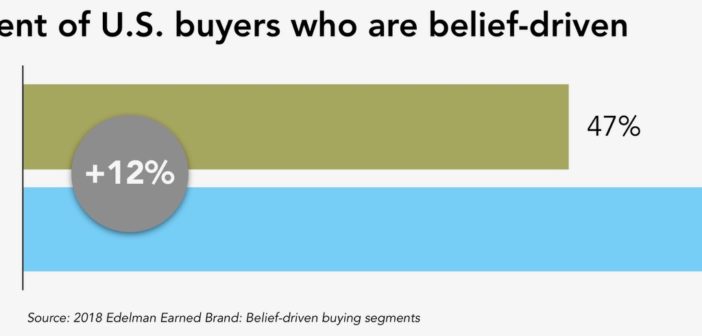The Elephant in the Room
FEC Repeat Appeal May Have Lost Its Mojo

Randy White
By Randy White, CEO/White Hutchison Leisure & Learning Group
Offering the coolest bowling, arcade games and go-karts or the tastiest, trendiest burger no longer cuts it. Just excelling in quality and experience is no longer enough to assure customer loyalty and repeat appeal. Consumer businesses today have to stand for something that resonates with consumers; they need to have a purpose that is more than selling their products, services or experiences. There is a large body of consumer research that documents the importance of being a “purpose-driven business.” Following are the results from five major studies that hopefully will help readers as they navigate consumer satisfaction waters.
The Edelman 2018 Earned Brand study published last October highlighted that nearly six in 10 U.S. consumers (59 percent) now buy on belief, taking a brand’s mission and activism into account when making decisions about what to purchase – a staggering statistic up 12 points from the previous year. The big takeaway from the study is that what a business stands for now matters more than ever. People will choose –– or switch to –– a business that matches their personal values and has a positive societal impact.
Richard Edelman, CEO of Edelman, said the increase is likely due to two factors: growing uncertainty about the state of the world today and growing pressure from competition. According to Edelman, people who don’t feel government represents them or their interests are looking to companies to provide a large-scale moral compass — and rewarding those that do.
“Brands are a way to express your opinions and have someone respond,” he said. “In this case, people go with their pocketbooks in a way. They want business to take the lead on change, and they want to feel as if they’re making an impact.”
The Shelton Group says that “social purpose is the new black.” Their research finds that 86 percent of consumers believe that companies should take a stand on social issues. Nearly two-thirds (64 percent) of consumers who said it’s “extremely important” for a company to take a stand on a social issue said they were “very likely” to make a purchase based on that commitment.
Accenture, in its October 2018 “From Me to We, the Rise of the Purpose-Led Brand” report, found that consumers in the United States are no longer making decisions based solely on selection or price. They’re assessing what a company says, what it does and what it stands for. They support companies whose purpose aligns with their beliefs. And they reject those that don’t, with one in five walking away forever.
The 2018 Cone/Porter Novelli Purpose Study says that “Purpose is more than just a trend, it’s the new norm. Americans have expectations of companies to lead with purpose by not just making money, but positively impacting society as well. Companies need to identify, communicate and live their purpose to maintain relevance, trust and competitive advantage.”
The study found that more than three-quarters of Americans (78 percent) believe it is no longer acceptable for companies to just make money, they expect companies to positively impact society as well. And they believe purpose is industry agnostic. Three-quarters of Americans feel strongly that all industries must be purpose-driven.
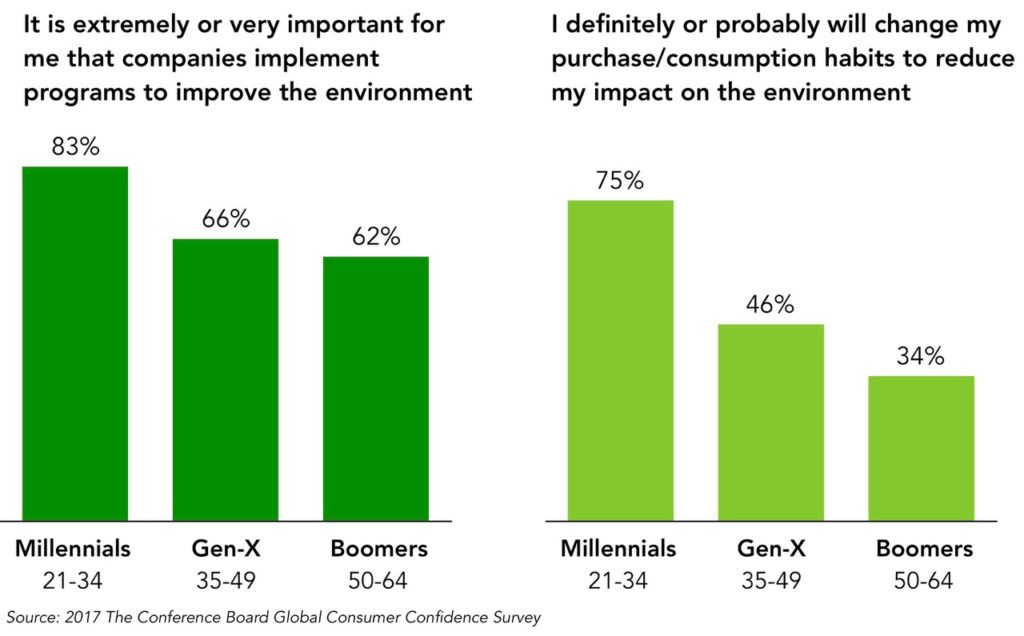
The Cone study found that nearly eight-in-ten consumers (79 percent) say they would be more loyal to a purpose-driven company. The majority (57 percent) are willing to even pay more to lend support to their favorite companies and over three-quarters (78 percent) will tell others with positive word of mouth to buy from that company.
The study concluded: “Purpose is more than a trendy buzzword or shiny new tool in a marketer’s arsenal, it is a way of doing business that is deeply embedded into the business, brand and experience that is delivered. It’s a North Star, a guiding principle and strong message to the marketplace. Companies that lead with purpose will find it opens doors to an entirely new level of consumer relationship.”
This significant shift in consumer values and purchase intent found in these studies has created a new consumer segment often referred to as “conscientious consumers.” They believe a company’s values, actions and corporate reputation are just as important as the products, services and experiences it offers and prioritize principle over product, service or experience. Conscientious consumers cross all ages, demographics and geographies, but skew to Millennials and Gen Xs, full-time workers, well-educated, high-income earners and parents.
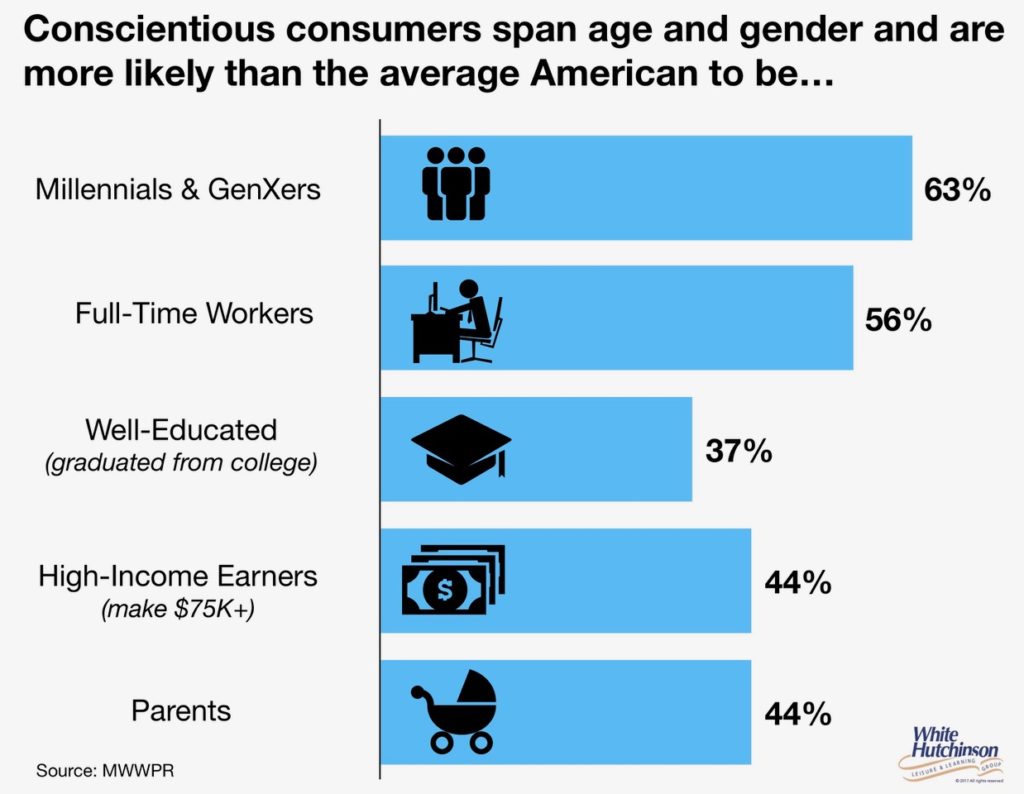 Conscientious consumers are more loyal, less price-sensitive and more vocal than most Americans about the brands and companies they believe in and support. They stay loyal to a company they believe is trying to do the right thing even if they weren’t satisfied with its offerings. Two-thirds will pay full price for a product that supports a cause they believe in or reflects their personal values rather than buying a product at a discounted price from another company.
Conscientious consumers are more loyal, less price-sensitive and more vocal than most Americans about the brands and companies they believe in and support. They stay loyal to a company they believe is trying to do the right thing even if they weren’t satisfied with its offerings. Two-thirds will pay full price for a product that supports a cause they believe in or reflects their personal values rather than buying a product at a discounted price from another company.
Carreen Winters, Chair Reputation Management and Chief Strategy Officer at MWWPR, explained it this way. “A few things have changed. In the past, we defined as ‘good’ in the absence of the company doing anything wrong. Today, ‘corpsumers’ (what MWWPR calls conscientious consumers) actually investigate and seek out information in a desire to see if the company is worth doing business with. And the information they seek isn’t just about the product, but their behavior… They are also willing to pay a premium for a brand’s products that support causes they believe in — which was validated by our research.”
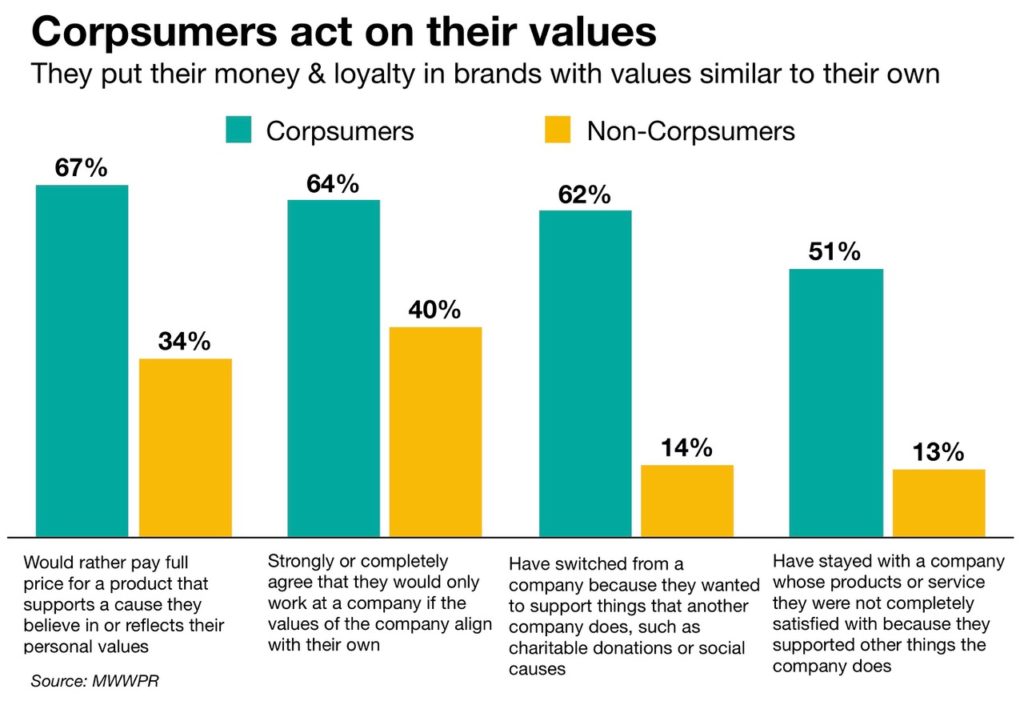
MWWPR reports that corpsumers are brand activists. They pride themselves on influencing their friends and families and using their social media channels to broadcast their support or disapproval of companies and urge their followers to act accordingly. Three-quarters (76 percent) have encouraged someone to buy a product or service because they want him or her to support the company. Three in four (74 percent) corpsumers have encouraged someone to give up or not use a product because of a company’s reputation.
Elizabeth Currid-Halkett, author of The Sum of Small Things, has identified a rising new class in America that is tied to a shared set of cultural practices and social norms who are also conscientious consumers. She says this new cultural elite consumer, the aspirational class, is on the rise. They’re people who aren’t defined by their incomes, but rather by their higher educations and cultural capital. They share a set of beliefs on the most socially conscientious ways to spend money that becomes a significant part of their identity and social capital. This aspirational class is basically the top 20 to 25 precent socioeconomic of the population.
Currid-Halkett sees these consumers as driven primarily by an aspiration to acquire knowledge and to then use that information to form socially and environmentally conscientious values and behaviors that define them and at least makes them appear to be “their versions of better humans in all aspects of their lives.” Part of aspirational class consumerism is rooted in the value of “conspicuous production” –– transparency in production and processes that create socially and environmentally responsible offerings that justifies the expense and is inherent to the value of most of the consumer offerings they purchase. To them, the sourcing, the production, the creation of the offering is the value.
The aspirational class has a clear moral compass. They worry about climate change and personal dignity, they want to preserve regional and local identity, they are concerned about their children’s and the planet’s future. They aspire to limit their carbon footprint, go “green,” buy organic and sustainable products, make sure the origin can be traced and that the labor used to make them has not been exploited. In short, they “aspire” to be better human beings and politicize their social conscientiousness and environmental awareness through their consumer choices, which acts as a signal of their philosophy of life, their value system and becomes part of their social capital and class identification.
Today, a large segment of consumers, including conscientious consumers and the aspirational class, increasingly view corporate responsibility –– from organic ingredients to animal welfare to company treatment of employees to sustainable practices –– as aspects of quality, not just a “feel-good factor.” In fact, they often consider purchasing from an ethical company as a luxury and as a status symbol. For them, the idea of luxury is defined far less by expensive possessions than by a set of cultural values. Terms such as organic and sustainable are now used to convey a sense of high-value luxury.
Currid-Halkett’s theory is that “social, environmental, and cultural awareness” have become the new social capital. She says that because most consumer products are now widely available, all but the most exclusive items have lost their value as class signifiers. In their place, what she calls conspicuous leisure and inconspicuous consumption that broadcast a consumer’s high education levels and cultural awareness to their peers by the leisure they participation in, the time saving services they use and their purchases. Sustainably-made goods work as status symbols. Ordering a grass-fed organic hamburger is now both a luxury, as well as something that will gain you social capital among your peers.
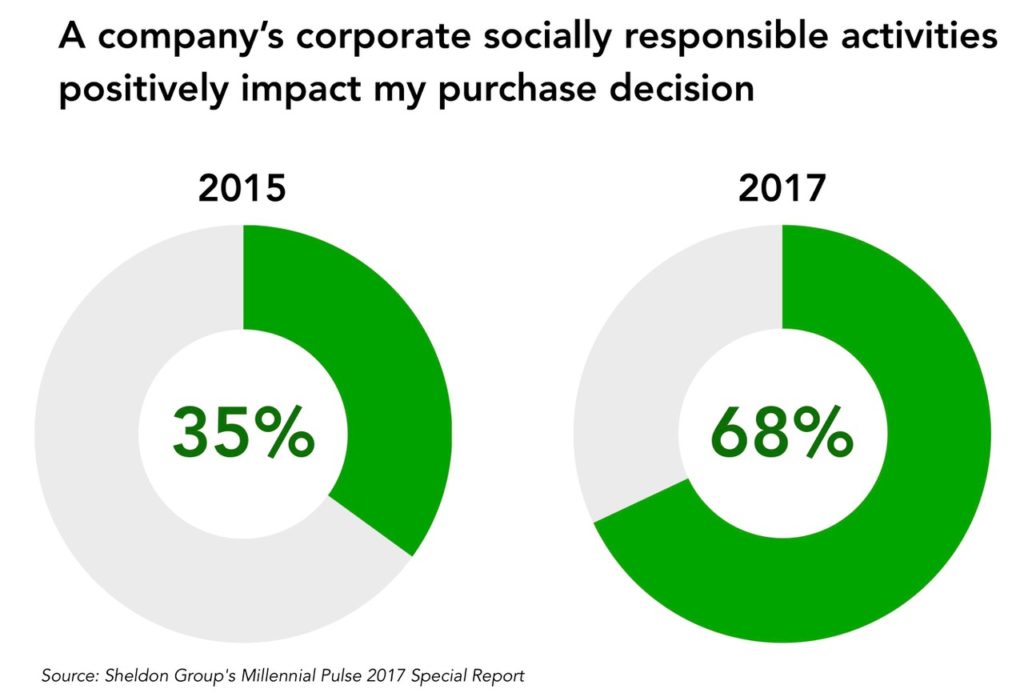
This significant shift in consumer culture means that social good has become the new cool. Whether you call them corpsumers, conscientious consumers, socially-conscious consumers or the aspirational class, this segment of consumers is a significant force that any consumer company needs to understand and address today.
In marketing, it used to be about the four Ps — price, product, promotion and place. Now with the conscientious consumers it needs to include a fifth P — purpose. Just having a great product, service, or leisure or entertainment experience is no longer sufficient to succeed today. What a company stands for, its purpose and its social, ethnical and environment actions, its social accountability, has now become integral to its offerings’ benefits for a large part of the population.
There is now a blurring of the lines — people are blending their consumer choices and their beliefs and values into one. This blending of consumerism and social conscientiousness has created expectations about how products are grown and made, how employees are treated and how the environment is impacted. Being a good-citizen business is no longer something companies can shy away from if they want to be at the forefront of consumers’ minds.
Meeting conscientious consumers’ values is especially important today for location-based entertainment and leisure venues. As Cone, MWWRP and Currid-Halkett found, these consumers skew heavily to higher educated and higher incomes, a demographic that accounts for the large majority (70 percent) of all entertainment spending at community-based entertainment venues such as FECs, including bowling and laser-tag venues.
Our company, the White Hutchinson Leisure & Learning Group, is proud to be at the forefront of the design and production of socially and environmentally responsible businesses in the LBE and family entertainment center FEC industries. The highly sustainable Ocean5 and its Table 47 restaurant we designed and helped produce, which opened last year, achieved a LEED (Leadership in Energy and Environmental Design) Silver Certification. It’s the world’s first eatertainment project and the first with laser tag to earn a LEED certification, as well as the first project with bowling to receive a Silver or higher-level certification.
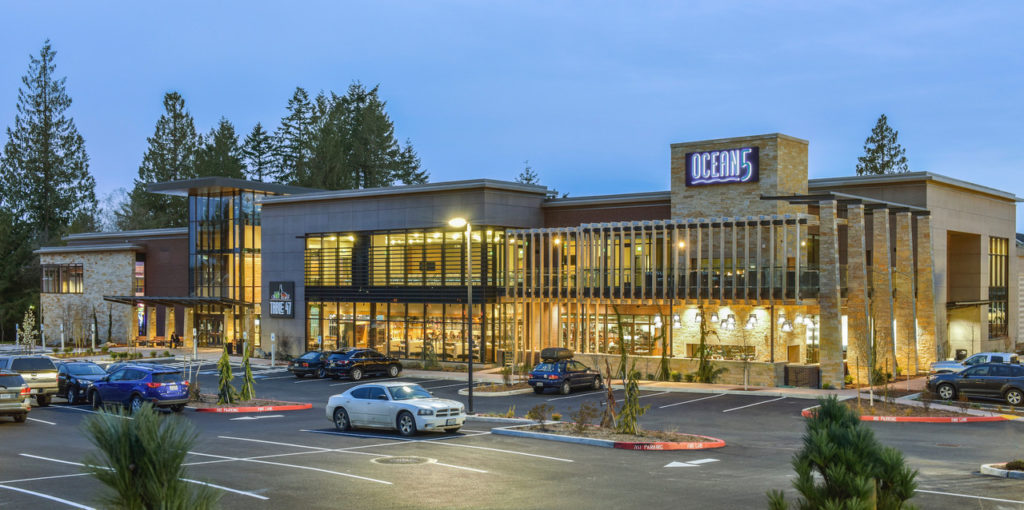
White Hutchinson designed and help produce the environmentally responsible Ocean5 and Table 47 restaurant, which opened last year by Puget Sound, Washington.
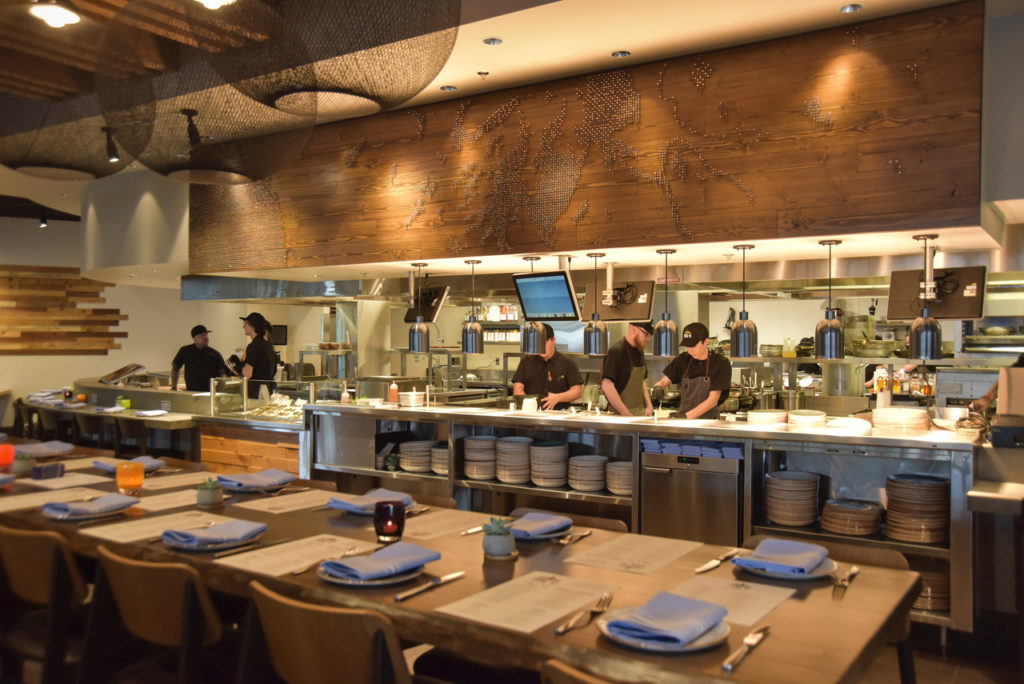 The environmentally responsible center was inspired by Troy Alstead’s love of the oceans (he’s the owner and former COO of Starbucks). He describes the business’ purpose-driven philosophy this way: “We will use the platform of the business to drive awareness and inspire action to improve the health of the oceans and seas, starting with Puget Sound (where Ocean5 is located). We will tell stories about how we are responsibly sourcing our ingredients, how we constructed the building to be gentle on the environment, how we use geothermal wells around the building to reduce our energy consumption.”
The environmentally responsible center was inspired by Troy Alstead’s love of the oceans (he’s the owner and former COO of Starbucks). He describes the business’ purpose-driven philosophy this way: “We will use the platform of the business to drive awareness and inspire action to improve the health of the oceans and seas, starting with Puget Sound (where Ocean5 is located). We will tell stories about how we are responsibly sourcing our ingredients, how we constructed the building to be gentle on the environment, how we use geothermal wells around the building to reduce our energy consumption.”
Among the sustainable features we designed are the building’s heating and cooling system operated by 72 geothermal wells that total 3.6 miles in length and its locally sourced wood décor which was harvested within 200 miles of the project. Other environmentally sustainable design elements include:
• extensive daylight harvesting to minimize the use of electric lighting during the daytime
• low-energy bowling and laser tag equipment
• a worm farm to compost all the restroom’s paper towels, which are not accepted by the areas compositing program
• the restaurant’s (minimal) preproduction vegetable waste
• carpeting made from harvested recycled fishing nets to reduce ocean plastics
As a result of all its sustainability features, the building is 40 percent more efficient than a typical building of its type. The energy saved is equivalent to what 36 typical homes use.
The separately branded Table 47 sea- and farm-to-table restaurant focuses on local, sustainable ingredients and the minimization of food waste. In addition to seasonal sourcing from as many local farmers, ranchers and fisherman as possible, the bar follows sustainable practices by sourcing alcohol based on three criteria: local, sustainable and taste. As a result, many of the big-name spirit brands will not be found here, but rather equal or better tasting ones from local and sustainable producers.
Both Ocean5 and its Table 47 restaurant have raised the bar by setting a new standard for the socially and environmentally responsible development and operation of eatertainment and other community entertainment venues. We hope it will inspire other projects in the location-based entertainment industry to be purpose-driven.
© 2019 White Hutchinson Leisure & Learning Group
The White Hutchinson Leisure & Learning Group is a multi-disciplinary firm specializing in feasibility, concept and brand development, design and consulting for entertainment facilities. Over the past 26 years, the company has worked for over 500 clients in 32 countries, and won 16 first-place design awards. It publishes an occasional Leisure eNewsletter and Tweets (@whitehutchinson); Randy blogs. He is also a founder, co-regent and presenter at Foundations Entertainment University, now in its 13th year. Randy can be reached at 816/931-1040, ext. 100, or via the company’s website at www.white hutchinson.com. © 2015 White Hutchinson Leisure & Learning Group

